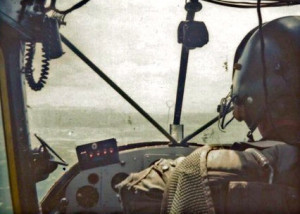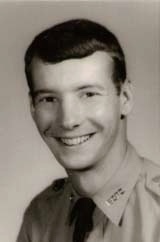Bud Domagata – Forward Observer – Part Five
From the Frying Pan Into The Air
When I came to Vietnam I was told I would be a forward observer for about four months, then four months work in a battery, and then four months working in liaison. After nine months of being an FO, it was obvious that none of this was going to happen. If I stayed in the field as an FO I was sure my number was going to come up. So I extended my tour in Vietnam to become an air observer, still calling in artillery fire but now from the air.
I had experience with air observers bailing me out several times. I’m in the jungle getting shot at, we’re in too thick a jungle and I can’t see, I know the direction we were getting shot at from, but I didn’t know from how far, and this AO all of a sudden brings clarity to my life and saves our bacon. And I knew that every night he went home and slept in a bed, had someone fix him a meal, had a hot shower at some airstrip. I did not ever want to sleep in the jungle again. I did not want to have to pull off blood suckers again, I did not want to have to be low on ammo, low on food. I didn’t want to get shot at on the ground any more. If you want to shoot at me in the air, fine, I’ll take that, but I want a bed at night, a meal. I don’t care how bad the mess hall fixes the meal, it’s going to be better than any meal I ever had in my canteen cup. The AO had a little excitement in his day, and then he went home. He went to a bed. And he still got respect. I did not want to go back to a motor pool, or have to inventory canteens, or some pain in the butt thing like that.
I was an air observer for the next ten months, from October 1969 to August 1970 when I went home. I flew almost every day supporting fire missions when somebody on the ground was in trouble. When I wasn’t doing that I was registering the guns for the batteries around Phan Thiet, Sherry, Sandy and Betty, for Charlie battery up near Dalat, and for guns out on mobile operations. I was attached to Task Force South (covering the southern end of the Central Highlands of Vietnam) and therefore worked with all of its infantry, cavalry and artillery units in that area.
Registering artillery pieces was similar to adjusting a rifle sight. It involved adjusting rounds to hit a known coordinate (similar to a target bull’s eye) in order to adjust the settings on the howitzer for maximum accuracy. Howitzers had to be registered whenever they were moved, and periodically when they remained in place or received a new lot of ammo. It was a never ending and important task.

Bud’s view from the back seat of his Seahorse aircraft
Walter “Hoot” Gibson
It’s October and I am a brand new air observer supporting a fire mission for the 3/506 infantry, the guys I was with for five months and just left. I’m in the air and my guys are under attack. Okay, let’s take a leap back three months to when I was their forward observer and accepted as a guy who knows what he’s doing. We lose a platoon leader. I don’t recall how we lost him, but now we are a platoon leader short. The commanding officer says to me, “Bud, I need you to run the platoon until we get a platoon leader.” The platoon sergeant has been there a long time and the squad leaders are good, so no big deal.
When the new platoon leader comes in he is he is a second lieutenant just out of cavalry ROTC, not infantry and not airborne. The CO says, “Bud, you stay with him for about a week and make sure he doesn’t get into trouble. Between you, me and the platoon sergeant we’ll get him seasoned. He’ll do well.” He is from Georgia, and he has this cowboy sort of southern accent, a little bit of a slow drawl, an Atlanta drawl. His name is Walter Gibson, but we call him Hoot Gibson.
I connect with Hoot more than anybody, because I have to be with him, and I have to make sure he knows things, that he knows how to take care of the guys. It’s all about the guys. I am not officially responsible, but I could probably run a platoon as good as most because I have been in the field eight months by now. The CO was right, Hoot is sharp and does well and I feel good about him. I recall that he could read a map, or at least he led me to believe that he could.
Now flash forward. I am in the air supporting the operation where Hoot’s company is under attack. He charges the ambush and is killed and his squad leader is shot up read bad. I stay flying above them while a jungle penetrator helicopter pulls up the wounded squad leader. Out of all the guys I was with in Vietnam, of all the 3/506 airborne guys, he is the only name I remember. I remember Hoot Gibson.
I learned later that Hoot, his platoon sergeant and his squad leader did not want to go charging into that ambush. But his hard charging battalion commander, flying safely in his chopper two thousand feet in the air, pushed Gibson into the charge.
So now go 30 years later. I am at the 3/506 reunion where they gave me the Screaming Eagle statue and plaque. Do you know who is there? Hoot Gibson’s dad. Oh my gosh. The dad’s old as dirt, he is in his 80′s. It is a great thing. Also at this reunion is Hoot’s squad leader who got wounded in that same attack. I remember him. I do not remember his name but he is there with his wife, and Hoot’s dad is there. I am awestruck.

Walter “Hoot” Gibson
Died October 28, 1969 three months into his tour
Picture courtesy Mike Rogers
LZ Sherry
I never set foot on Sherry, but what I remember most are the guys on the radio, guys like yourself and the fire direction officers. I had an affinity with the fire direction officers because most of them had been forward observers, and that was their motivation to get rounds out fast. That was the sequence. When you are a forward observer you know it’s important to get rounds out fast. Then when you get to be a fire direction officer and you make sure those rounds get out fast. You’re the jockey on this horse. We would BS on the radio about the units and where you’re at, or we would talk about R&R’s, here and there, where did you go and what did you buy, who got the biggest camera and the best stereo or the best reel-to-reel TEAC. That was my radio conversation with these guys. To avoid the official radio freak (frequency) we would go up or down a couple of clicks on the dial to have these non-official gab sessions. I remember “meet you up a nickel” meant we’d tune five megahertz up on the freak dial.
I remember a couple of times dropping a red mailbag down to Sherry guys. The traditional way was you would send your convoy in. But sometimes flying over Sherry we’d put the flaps down, and if it was a windy day and we were flying into the wind we could be flying 30 miles an hour ground speed, almost be like a helicopter, and drop the red bag out. The mailbags were always red.
Looking Back
The things I remember most. Coming home. (Laughs) Being done. Just surviving so many crazy times. Friendly fire by another American unit. I went through that without anybody getting killed.
I just remember the intensity of fear of making a mistake. If I read this map wrong, if I transpose these numbers. We had this thing called the SOI (Signal Operating Instructions: codes for radio communications) that little white book with encrypted numbers that was always changing. How many times can I do this and call it in and make sure there is no mistake? The fear of calling in a round on the wrong place. I talked to the gun bunnies and to some of the fire direction guys, and I was never really worried about the guns. I was afraid of myself, of making a mistake. If you’re getting attacked you’ve got to be fast. These guys are pinned down, and BOOM, BOOM mortars coming in. It was like, “Oh man, do it fast, do it fast.” The fear of making a mistake was there every minute.
Bud called in artillery fire from the field and from the air for an unrelieved 19 months during a period of heavy conflict. Not once did he call in bad data, not once did he misread a map, and never did he fail to protect his men. He doesn’t remember most of it, but the men he saved will never forget.



